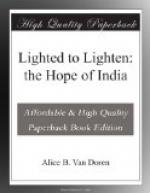The play was given in a dimly lighted court, with simple costumes and the crudest stage properties. But one spectator will not soon forget the schoolgirl heroine whose masses of black hair swept to her knees. She lived again all the pathos, the anger and despair and reconciliation of the old tale, and her audience thrilled with her as at the touch of a tragedy queen.
Student Government.
Co-operation in school government and discipline is one of the most educational experiences that an Indian girl can pass through. To feel the responsibility for her own actions and those of her schoolmates, to form impersonal judgments that have no relation to one’s likes and dislikes, these are lessons found not between the covers of text-books, but at the very heart of life-experience. Under such moral strain and stress character develops, not as a hothouse growth of unreal dreams and theories, but as the sturdy product of life situations.
Some schools divide themselves into groups, each of which elects a “queen” to represent and to rule. The queens with elected teachers and the principal form the governing body, before which all questions of discipline come for settlement. Great is the office of a queen. She is usually well beloved, but also at times well hated, for the “Court” occasionally dispenses punishments far heavier than the teachers alone would dare to inflict and its members often realize the truth of Shakespeare’s statement, “Uneasy lies the head that wears a crown.”
[Illustration: PRIESTS OF THE HINDU TEMPLE.]
The “Court” is now in session and has two culprits before its bar. Abundance has been found to have a cake of soap and a mirror, not her own, shut up in her box. Lotus copied her best friend’s composition and handed it in as hers. What shall be done to the two? Discussion waxes hot. The play hour passes. Shouts and laughter come in from the tennis court and the basket ball field. Every one is having a good time save the culprits and the four queens, who pay the penalty of greatness and bear on their young shoulders the burdens of the world. Evidence is hard to collect, for the witnesses disagree among themselves. Then there are other complications. Abundance stole things which you can see and touch, while Lotus’s theft was only one of intangible thoughts. Furthermore, Abundance comes from a no-account family, quite “down and out,” while Lotus is a pastor’s daughter and as such entitled to due respect and deference. And still further, nobody likes Abundance, while Lotus is very popular and counts one of the queens as her intimate friend. Much time passes, the supper bell rings, and the players troop noisily indoors, but the four burdened queens still struggle with their dawning sense of justice. At last, as the swift darkness drops, the case is closed and judgment pronounced. Much time has been consumed, but four girls have learned a few of life’s big lessons, not found in books, such as: that thoughts are just as real as things; that likes and dislikes have nothing to do with matters of discipline; that a girl of a “way up” family should have more expected of her than one who is “down and out.” Perhaps that experience will count more than any “original” in geometry.




